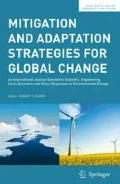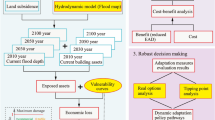Abstract
With concerns regarding global climate change increasing, recent studies on adapting to nonstationary climate change recommended a different planning strategy that could spread risks. Uncertainty in global climate change should be considered in any decision-making processes for flood mitigation strategies, especially in areas within a monsoon climate regime. This study applied a novel planning method called real option analysis (ROA) to an important water resources planning practice in Korea. The proposed method can easily be applied to other watersheds that are threatened by flood risk under climate change. ROA offers flexibility for decision-makers to reflect uncertainty at every stage during the project planning period. We successfully implemented ROA using a binomial tree model, including two real options—delay and abandon—to evaluate flood mitigation alternatives for the Yeongsan River Basin in Korea. The priority ranking of the four alternatives between the traditional discount cash flow (DCF) and ROA remained the same; however, two alternatives that were assessed as economically infeasible using DCF, were economically feasible using ROA. The binomial decision trees generated in this study are expected to be informative for decision-makers to conceptualize their adaptive planning procedure.




Similar content being viewed by others
References
Bae DH, Jung IW, Lee BJ (2007) Outlook on variation of water resources in Korea under SRES A2 scenario. J Korean water Resour Assoc 40:921–930 (written in Korean)
Baldwin CY, Ruback R (1986) Inflation, uncertainty, and investment. J Finance 41:657–669
Borison A, Hamm G, Farrier S, Swier G (2008) Real options and urban water resource planning in Australia. WSAA Occas. Pap. 20, Water Serv Assoc of Aust, Melbourne, Australia
Brugnach M et al (2008) Toward a relational concept of uncertainty: about knowing too little, knowing too differently, and accepting not to know. Ecol Soc 13(2):30
Buurman J, Babovic V (2016) Adaptation pathways and real options analysis: an approach to deep uncertainty in climate change adaptation policies. Policy Soc 35(2):137–150
Cox JC, Ross SA, Rubinstein M (1979) Option pricing: a simplified approach. J Financ Econ 7(3):229–263
Deng Y et al (2013) Valuing flexibilities in the design of urban water management systems. Water Res 47(20):7162–7174
Dixit AK, Pindyck RS (1994) Investment under uncertainty. Princeton University Press, Princeton
Huff FA (1967) Time distribution of rainfall in heavy storms. Water Resour Res 3(4):1007–1019
Hussey J, Hussey R (1999) Discounted cash flow. In: Business accounting. Macmillan Education, UK, pp 265–273
Jeuland M, Whittington D (2013) Water resources planning under climate change: a “real options” application to investment planning in the Blue Nile environment-for-development. Discussion paper series no. dp-13-05-efd
IPCC (2001) Climate change 2001: The Scientific Basis, Third Assessment Report of the Intergovernmental Panel on Climate Change. Houghton JT et al (eds) Cambridge University Press, Cambridge, UK
Kester WC (1984) Today’s options for tomorrow’s growth. Harv Bus Rev 62:153–160
Kim YO, Chung ES (2017) Adaptation to climate change: decision-making. In: Kolokytha E et al (eds) Sustainable water resources planning and management under climate change. Springer, Singapore, pp 189–221
Kim TS et al. (2004) A study on improvement in economic analysis of flood management plan. Ministry Construction & Transportation (written in Korean)
Kjaerland F (2007) A real option analysis of investments in hydropower: the case of Norway. Energy Policy 35(11):5901–5908
Kodukula P, Papudesu C (2006) Project valuation using real options: a practitioner’s guide. J Ross Publishing, Florida
Kwadijk JC et al (2010) Using adaptation tipping points to prepare for climate change and sea level rise: a case study in the Netherlands. Wiley Interdiscip Rev Clim Chang 1:729–740
Lau KT, Fan H, Onof C (2006) The potential use of the Black-Scholes model in urban drainage risk management. Dissertation, Imperial College of Science, Technology and Medicine, London, UK
Lee JK, Kim YO (2012) Selecting climate change scenarios reflecting uncertainties. Atmosphere 22(2):149–161 (written in Korean with English abstract)
Lempert RJ et al (2000) The impacts of climate variability on near-term policy choices and the value of information. Clim Chang 45(1):129–161
Majd S, Pindyck RS (1987) Time to build, option value, and investment decisions. J Financ Econ 18:7–27
Mason SP, Merton RC (1985) The role of contingent claims analysis in corporate finance. In: Altman E, Subrahmanyam M (eds) Recent advance in corporate finance. Irwin, Homewood, pp 7–54
McDonald RL, Siegel DR (1986) The value of waiting to invest. Quarterly J Econ 101:707–727
Means E et al (2010) Decision support planning methods: incorporating climate change uncertainties into water planning. Water Utility Climate Alliance, San Francisco
Michailidis A, Mattas K (2007) Using real options theory to irrigation dam investment analysis: an application of binomial option pricing model. Water Resour Manag 21(10):1717–1733
MLIT (2005) The comprehensive flood mitigation plan: Yeongsan River Basin, Ministry of Land, Infrastructure and Transport (written in Korean)
Myers SC (1977) Determinants of corporate borrowing. J Financ Econ 5(2):147–175
Myers SC, Majd S (1990) Abandonment value and project life. Adv Futures Options Res 4:1–21
Paddock JL, Siegel DR, Smitha JL (1988) Option valuation of claims on real assets: the case of offshore petroleum leases. Quarterly J Econ 103:479–508
Samis M et al (2011) Using dynamic DCF and real option methods for economic analysis. Technical Reports NI43–101. Retrieved from http://inside.mines.edu/~gdavis/Papers/ValMin.pdf
Seo ST (2006) A real options approach to the investment analysis of irrigation systems. The Korean J Agric Econ 47(1):31–50 (written in Korean with English abstract)
Steinschneider S, Brown C (2012) Dynamic reservoir management with real-option risk hedging as a robust adaptation to nonstationary climate. Water Resour Res. doi:10.1029/2011WR011540
Stocker T et al (2013) Technical summary. In: Stocker T et al (eds) Climate change 2013: the physical science basis. Contribution of Working Group I to the Fifth Assessment Report of the Intergovernmental Panel on Climate Change. Cambridge University Press, Cambridge
Stulz R (1982) Options on the minimum or maximum of two risky assets: analysis and applications. J Financ Econ 10:161–185
Tourinho O (1979) The option value of reserves of natural resources. Working paper no. 94. University of California, Berkeley
Trigeorgis L (1996) Real options: managerial flexibility and strategy in resource allocation. The MIT Press, Cambridge
Trigeorgis L, Mason SP (1987) Valuing managerial flexibility. Midland Corporate Finance J 5(1):14–21
UKCIP (2003) Climate adaptation: risk, uncertainty and decision-making. United Kingdom Climate Impacts Programme, Oxford
van der Pol TD et al (2017) Economic analysis of adaptive strategies for flood risk management under climate change. Mitig Adapt Strateg Glob Change 22(2):267–285
Wang XJ et al (2014) Adaptation to climate change impacts on water demand. Mitig Adapt Strateg Glob Chang 22(4):595–608
Acknowledgements
This research was supported by a grant (14AWMP-B082564-01) from the Advanced Water Management Research Program funded by the Ministry of Land, Infrastructure, and Transport of Korea, a grant (11 Technology Innovation C05) from the Construction Technology Innovation Program funded by Ministry of Land, Infrastructure and Transport, and a grant (2014001310007) from the Climate Change Correspondence Program funded by the Korea Ministry of Environment. The authors are grateful to the editors and the anonymous reviewers for their insightful comments and helpful suggestions.
Author information
Authors and Affiliations
Corresponding author
Rights and permissions
About this article
Cite this article
Ryu, Y., Kim, YO., Seo, S.B. et al. Application of real option analysis for planning under climate change uncertainty: a case study for evaluation of flood mitigation plans in Korea. Mitig Adapt Strateg Glob Change 23, 803–819 (2018). https://doi.org/10.1007/s11027-017-9760-1
Received:
Accepted:
Published:
Issue Date:
DOI: https://doi.org/10.1007/s11027-017-9760-1




